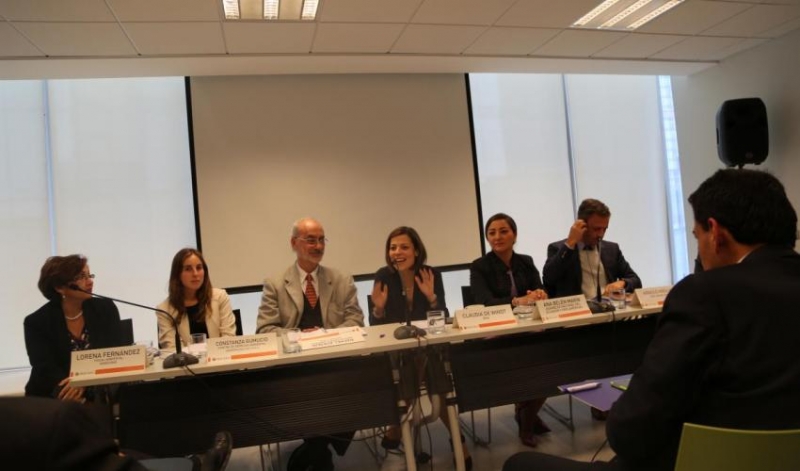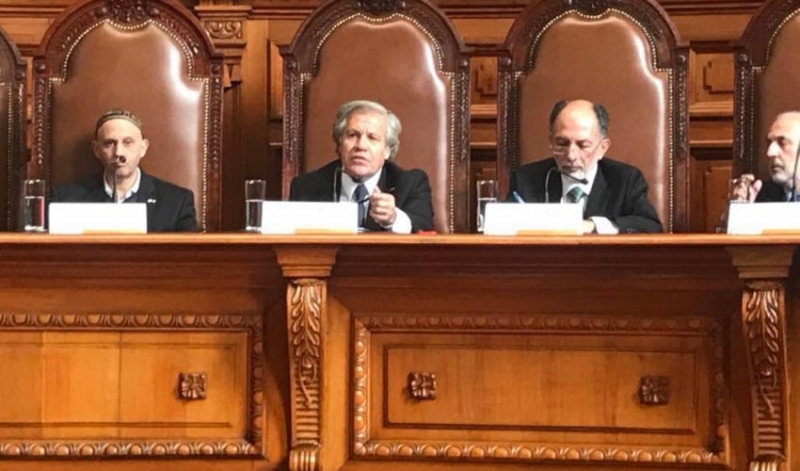On September 4-6, the Organization of American States (OAS), UN Environment, the Global Judicial Institute on the Environment (GJIE), the World Commission on Environmental Law (WCEL), the Supreme Court of Chile, and other partners convened the 2nd Inter-American Congress on the Environmental Rule of Law in Santiago, Chile.
 |
During the three days of the 2nd Inter-American Congress on the Environmental Rule of Law, judges, legislators, politicians, representatives from international agencies, NGOs, and participants whose papers were selected to be presented, discussed key issues to further contribute to achieving IUCN-WCEL goals related to the progressive development of legal and policy regimes built on the core principles of Environmental Rule of Law.
The first day, participants to the Congress gathered at the Supreme Court of Justice of Chile. Opening remarks were made by Chief Justice Hugo Dolmetsch (Supreme Court of Chile) who emphasized the increasing relevance of sound adjudication processes for the development of environmental law and to achieve sustainable development in the Inter-American region. Through an audiovisual message, OAS Secretary General Luis Almagro, addressed the participants at the Congress speaking on the importance of adopting a rights approach to achieve sustainable development goals by 2030, including a world free of pollution.
The first event of the Congress was a High-Level Panel chaired by Justice Sergio Muñoz (Supreme Court of Chile). During the panel, Chief Justice Ricardo Lorenzetti (Supreme Court of Argentina) addressed the need to effectively enforce the rights of access to information, public participation in decision-making, and access to justice, especially when the stakes of decisions capable of affecting natural resources, ecosystem services, and sustainability are high. Justice Antonio Benjamin(National High Court of Brazil and WCEL Chair) advanced key concepts to move towards the environmental rule of law through environmental due process and advocated in favor of the full enforcement by the judiciary of the principles in dubio pro natura and in dubio pro health. Justice Benjamin spoke also about the need to understand the concept of property not only as a bundle of economic rights, but also as an institution which has an ecological function inserted in its genetic code.
The Congress featured four thematic sessions on the following topics:
- Legal Frameworks for Water Resource Management
- Conflict Prevention and Management in Shared Natural Resources
- Trade, Investment and Environment
- Environmental Enforcement
The First Thematic Session on Legal Frameworks for Water Resource Management was chaired by Justice Michael Hanke Domas (Third Environmental Court, Valdivia, Chile), who pointed out how water laws are running on a separate track to legislation for environmental protection, and emphasized the need to develop comprehensive legal and policy frameworks for integrated and sustainable management of water resources and ecosystems. Panelists presented their selected papers on issues including the need to develop an international binding treaty recognizing the human right to water; the challenges to develop effective regulation of water rights to maintain adequate volumes for ecosystem services in watersheds; and the achievements on community based strategies to improve rural access to water and sanitation in Chile.
The Second Thematic Session on Trade, Investment and Environment was chaired by Gustavo Alanis (Mexican Center for Environmental Law - CEMDA), who spoke about the link between environmental protection and trade agreements, advocating for the full enforcement of non-regression in environmental protection measures as a guiding principle for international trade negotiations. The session featured also the presentation of papers covering topics like the role of ecosystem services in peace building after armed conflicts and the expansive nature of environmental law principles and their integration into private law practices, as well as the prevalence of collective rights related to environmental sustainability over private property rights.
On the second day of the Congress participants gathered at the Administrative Corporation of Chile’s Judiciary to follow discussions triggered by experts in the Third Thematic Session of the Congress on Conflict Prevention and Management on Shared Natural Resources. Building on the Chilean experience, Justice Sibel Villalobos (Third Environmental Court, Valdivia, Chile) spoke about the urgency to develop interdisciplinary frameworks of assessment to address the complex and pervasive conflicts threatening sustainable development and environmental justice globally was highlighted. Other presentations by participants presented their selected papers about alternative mechanisms for environmental conflict resolution and climate justice, among other relevant topics for conflict prevention and peace through natural resources conservation and sustainable management.
The Fourth Thematic Session on Environmental Enforcement was presented by Scott Fulton (Environmental Law Institute), who said that when the law is aligned with fundamental rights and values – like those subjacent in environmental protection principles and environmental law – it is more easily embraced and compliance can be more effectively achieved. Mr. Fulton also stated the importance of enforcement to deter violations to environmental law. On the same panel, Maria Amparo Alban (CIIAT, Ecuador) spoke about the key importance of effective procedural mechanisms to enforce substantive constitutional environmental rights.
After the session, participants split into working groups that held an intense and productive dialogue among civil society organizations and academia, youth, judges, prosecutors, parliamentarians, attorneys from the private sector, authorities from the Executive Branch, and international cooperation organizations, who advanced relevant findings and proposals to strengthen the environmental rule of law.
The last session of the Congress, chaired by Claudia De Windt (OAS), dealt with Environmental Rule of Law Trends and Emerging Themes. In the Panel, Professor Nicholas Bryner (University of California, Los Angeles), building on questions around the legal possibility of abolishing or shrinking national monuments or parks, alerted on the necessity to stop violations of the principle of non-regression to preserve lands and natural resources into the future. Justice Rafael Asenjo (Environmental Court of Santiago, Chile) advocated for the elimination of asymmetries of information between parties in environmental conflicts as an essential condition for access to environmental justice, and presented sound arguments to move towards strict liability legal frameworks to accomplish effective restoration and compensation of environmental damages. Lorena Fernández (Environmental Prosecutor, Honduras) highlighted the need to strengthen capacities of prosecutors to produce and defend scientific evidence on cases regarding wildlife trafficking and other environmental crimes, and to find avenues to promote collaboration between prosecutors and judges to protect the environment and biodiversity. During his participation at the session, Arnold Kreilhuber (UN Environment) said that environmental rule of law is for the people and spoke about the need to emphasize deterrence through effective prevention mechanisms in addition to effective environmental liability frameworks.
 |
On the last day of the Congress, after a visit to the Constitutional Court of Chile, participants gathered again at the impressive in the Supreme Court of Justice for an unplugged session where Justice Sergio Muñoz pointed out how the relevant findings and proposals emanated from the Congress to strengthen the environmental rule of law and can now assist to shape discussions at the 3rd UN Environment Assembly that will gather in Nairobi, Kenya in December, under the theme of pollution in its various forms. Jorge Abbott (Attorney General, Chile) gave remarks focused on the contribution of environmental law to move towards peaceful and free of pollution societies, with an intergenerational perspective. Sergio Dolman (Minister of Environment and Sustainable Development, Argentina) spoke about the ethics of environmental protection. Congressman Juan José Porras (Guatemala) referred to the duty to approach environmental protection from a non-political stance and to promote environmental education as a component to effectively enforce the rights of access to information, participation in decision-making, and access to justice.
At the closing session of the Congress, Chief Justice Dolmestch congratulated attendants to the Congress for contributing to a profound and powerful encounter of collective learning to strengthen the environmental rule of law that should now be translated into effective actions for sustainable development. Finally, Luis Almagro (OAS, Secretary General) reinforced the goal to guarantee more rights for more people by creating more peaceful and inclusive societies built on environmental justice and, also looking forward to the 3rd UN Environment Assembly, invited participants to the Congress to continue working for a planet free of pollution, where human rights can be enjoyed by all.
This post was originally published by the International Union for the Conservation of Nature (IUCN).